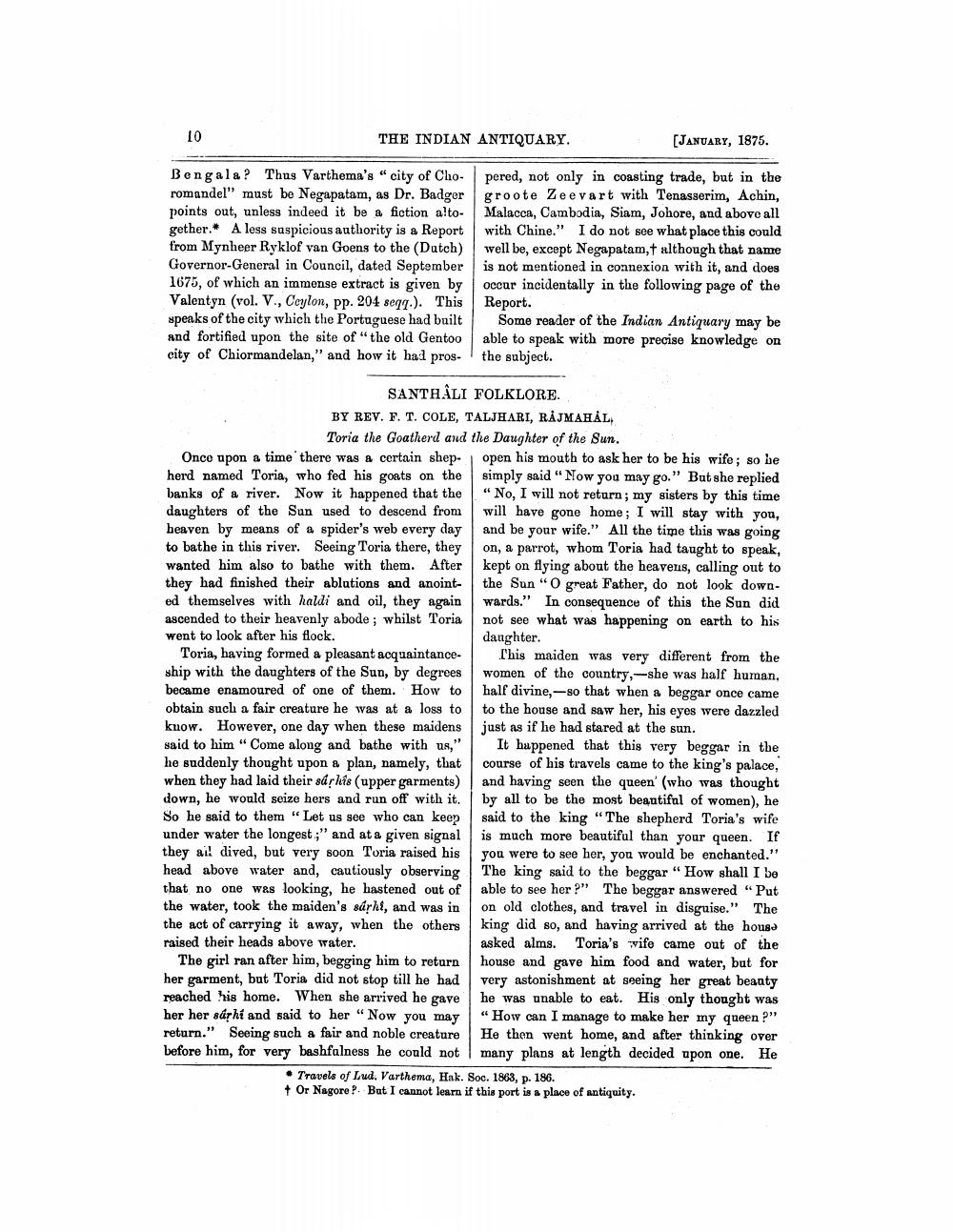________________
10
THE INDIAN ANTIQUARY.
(JANUARY, 1875.
Bengala ? Thus Varthema's "city of Cho romandel" must be Negapatam, as Dr. Badger points out, unless indeed it be a fiction altogether. A less suspicious authority is a Report from Mynheer Ryklof van Goens to the (Dutch) Governor-General in Council, dated September 1675, of which an immense extract is given by Valentyn (vol. V., Ceylon, pp. 204 seqq.). This speaks of the city which the Portuguese had built and fortified upon the site of "the old Gentoo city of Chiormandelan," and how it had pros.
pered, not only in coasting trade, but in the groote Zeevart with Tenasgerim, Achin, Malacca, Cambodia, Siam, Johore, and above all with Chine." I do not see what place this could well be, except Negapatam, although that name is not mentioned in connexion with it, and does occur incidentally in the following page of the Report.
Some reader of the Indian Antiquary may be able to speak with more precise knowledge on the subject.
SANTHÅLI FOLKLORE. BY REV. F. T. COLE, TALJHARI, RÅJMAHÅL.
Toria the Goathers and the Daughter of the Sun. Once upon a time there was a certain shep- open his mouth to ask her to be his wife ; so be herd named Toria, who fed his goats on the simply said "Now you may go." But she replied banks of a river. Now it happened that the "No, I will not return; my sisters by this time daughters of the Sun used to descend from will have gone home; I will stay with you, beaven by means of a spider's web every day and be your wife." All the time this was going to bathe in this river. Seeing Toria there, they on, a parrot, whom Toria had taught to speak, wanted him also to bathe with them. After kept on flying about the heavens, calling out to they had finished their ablutions and anoint- the Sun "O great Father, do not look down. ed themselves with haldi and oil, they again wards." In consequence of this the Sun did ascended to their heavenly abode ; whilst Toria not see what was happening on earth to his went to look after his flock.
daughter. Toria, having formed a pleasant acquaintance- This maiden was very different from the ship with the daughters of the Sun, by degrees | women of the country,-she was half human, became enamoured of one of them. How to half divine,-so that when a beggar once came obtain such a fair creature he was at a loss to to the house and saw her, his eyes were dazzled know. However, one day when these maidens just as if he had stared at the sun. said to him “Come along and bathe with us," It happened that this very beggar in the he suddenly thought upon a plan, namely, that course of his travels came to the king's palace, when they had laid their sárkis (upper garments) and having seen the queen' (who was thought down, he would seize hers and run off with it. by all to be the most beautiful of women), he So he said to them "Let us see who can keep said to the king "The shepherd Toria's wife under water the longest;" and at a given signal is much more beautiful than your queen. If they ail dived, but very soon Toria raised his you were to see her, you would be enchanted." head above water and, cautiously observing The king said to the beggar “How shall I be that no one was looking, he hastened out of able to see her?” The beggar answered "Put the water, took the maiden's sárhi, and was in on old clothes, and travel in disguise." The the act of carrying it away, when the others king did so, and having arrived at the house raised their heads above water.
asked alms. Toria's wife came out of the The girl ran after him, begging him to return house and gave him food and water, but for her garment, but Toria did not stop till he had very astonishment at seeing her great beauty reached his home. When she arrived he gave he was unable to eat. His only thought was her her sárhí and said to her "Now you may “How can I manage to make her my queen ?" return." Seeing such a fair and noble creature He then went home, and after thinking over before him, for very bashfulness he could not many plans at length decided upon one. He
• Travels of Lud. Varthema, Hak. Soc. 1863, p. 186. + Or Nagore P. But I cannot leam if this port is a place of antiquity.




